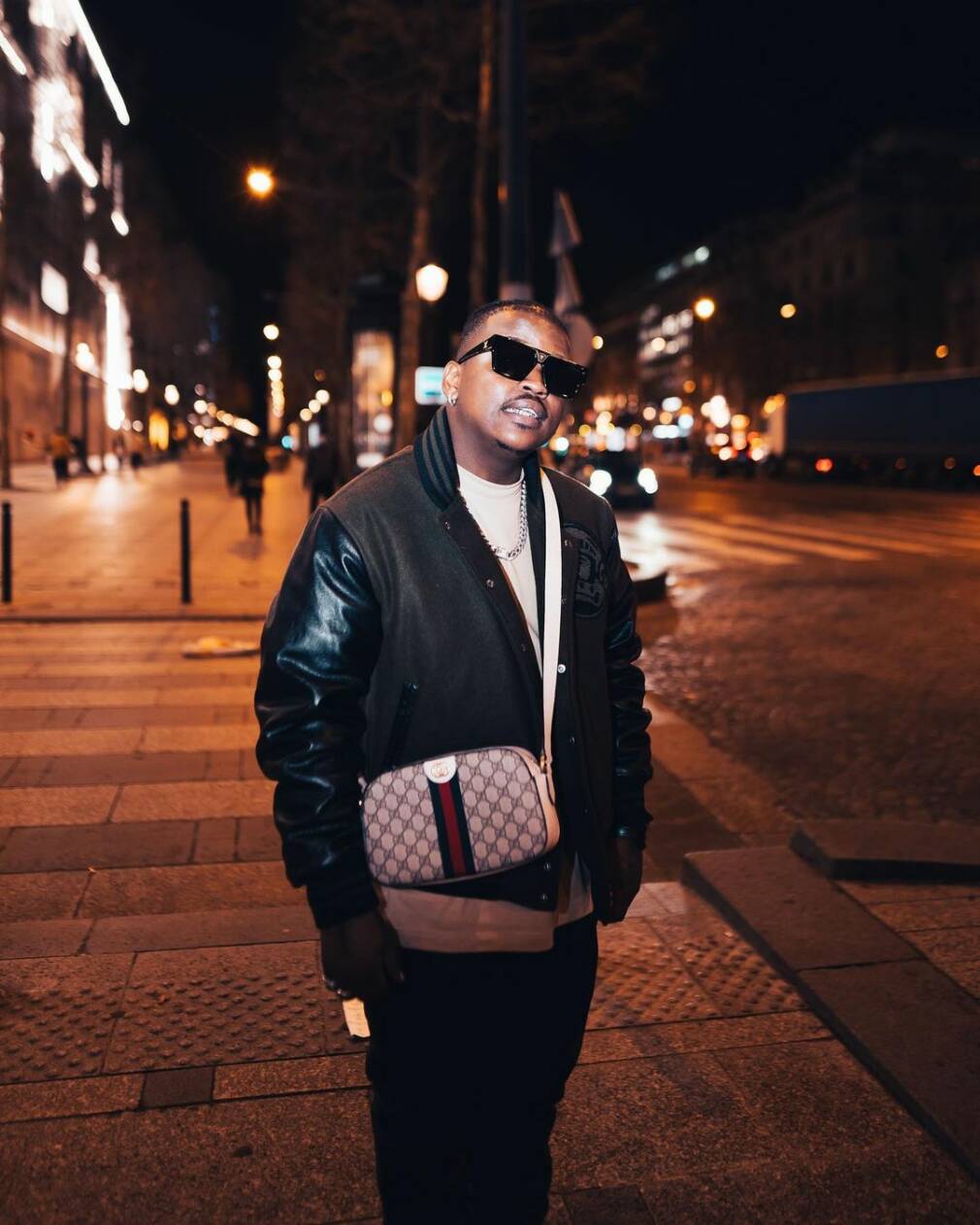We meet Lethabo Sebetso aka Focalistic in his Parisian hotel, a few days ahead of his performance in the French capital. The scene is almost prophetic: two years ago, his EP Quarantined Tarantino had seen him devote an entire track to the City of Light and the dreams he attached to it. He was a different Focalistic then, rapping in English on American trap music-inspired sounds; things have changed quite drastically. A leader of the amapiano wave, sweeping through every country at the moment, Foca is now to be found at the top of African charts, on the plane with superstar Davido or on tour in the UK with pure South African sounds and verses in sepitori, the urban lingua franca of Pretoria and the Tshwane metropolitan area. This switch in style, he says, is not really a switch. “Obviously, people feel like there has been a switch,” he begins after putting on his dark glasses. “But if you turn on a TV at home right now, I’m pretty sure you’ll see an American rapper. So you end up thinking you have to be like them to breakthrough. For me, there was just a moment where I felt confident enough to say ‘actually, you guys are going to hear me rap in Sepitori,’ over a Pitori beat. I’m going fully and that was a change I’ll never regret. Pitori to Paris!”
Pitorian music
Pitori, the nickname of Pretoria, is South Africa’s administrative capital, a few kilometers away from the bustling Johannesburg. “Where I come from, how we listen to music is through taxis,” he says. “The drivers use music to get their taxis full of kids. I used to hear RnB, hip-hop, and mostly bacardi (a sub-genre of house music that peaked in popularity in the country in the mid-2000s). Like the sound of DJ Mujava, for example.” In the shadow of the Union Building, the Mandela statue or Freedom Park, these are indeed the real monuments of Pretoria: figures like DJ Mujava, Machance or DJ Spoko, leaders and pioneers of bacardi music. While this scene has been largely forgotten due to lack of budget, management and documentation, Focalistic has always claimed his lineage to those producers, who made a profound impact on the culture without ever receiving their crowns. His first big track, “19 Tobetsa,” was actually a reference to Mujava’s “Tobetsa.” “For us, he represented dreams,” he says of the DJ. “He’s one of the first international acts we had from our hood. He showed us that sepitori could take over the country, the world: we are the kids of Mujava. My first interaction with a superstar was with him. I was playing soccer, and he drove past in a black BMW, drop top. I still remember all his verses.”
This “Pitorian” heritage is something important when knowing the contempt the Johannesburg hype has long held for Pretoria, judged as either administrative and boring, or raucous and rude. “We were called ‘ratchet’. The culture of taxis, playing loud music, people always hopping out the window… I had a double life: I stayed in the hood, but I went to school in Midrand, which is more residential, and where they listen to more hip-hop. That’s what created me: someone who understands the scenes in Pretoria, but who bought a T.I. CD as my first album.”
Being dual, being different, has been a constant in Focalistic’s career. One of the first to open up the local amapiano bubble to the rest of Africa, seeking out collaborations and gigs in Tanzania, Nigeria, Ghana and more, he was also one of the first to open up to journalists, in a scene known as impervious to the media. Having lived in two different worlds, the rough location of Ga-Rankuwa and the quiet suburbs of Midrand, he is at ease everywhere. Even in the middle of an unfamiliar city, after a short night and a tiring trip, his gaze is steady, his words are controlled, and no hint of intimidation shines through. “I studied political science, which allows me to see the propaganda being placed on us,” he explains. “We’ve been made to think we are different but we are not, there’s a hood in every country. Once I realized that, I was different. I was just moving and finding people with the same story in different countries, just having fun with the music the way we do in Pretoria, but on a world scale.” With that realization came confidence, and creating has never been easier for him: he doesn’t even write his verses anymore, he says after assuring us that he doesn’t consider himself a rapper anymore anyway.
President of the streets
Foca’s latest EP, President Ya Straata, was a condensed hit-list, loaded with layers of dark synthesizers, adlibs, punchlines and explosive log drums. The project’s title marked a new direction in how he now presents himself: the “President of the Streets”, voice of the voiceless. “People kept saying it to me!” he says when asked when he felt legitimate for such a title. “I’ve always just been doing my thing, telling my own stories. My music is my diary. And with time, people realized that I was always speaking about real stuff. If there’s a rule I don’t like, you’ll probably hear it in a song: I was one of the first people to say Fees Must Fall [the slogan of 2015 student protests against rising college tuition, ed.] I was nearly arrested, still in varsity! I’ve always said what I wanted to say, and I’m just glad that people relate to it. I guess everyone around the world is yearning for an honest president,” he adds with a laugh.
In his policies, His Excellency is accompanied by the 18 Area crew, a label he has founded. President, artist and businessman, he has surrounded himself with his friends who have professionalized themselves at the same time as him. “We produce, we perform, we tour… and we also have to be our own CEOs full time! That’s where the world is going today. If you’re not working that hard, then you’re the problem.” A philosophy that explains the message of the song “16 Days No Sleep”: “The title is pretty self-explanatory, but at the same time, that’s what the streets are speaking about. I’m sure that even on these streets, people will tell you they haven’t slept, trying to get to their dreams,” he says, turning towards Paris.

Working hard, being your own boss, pulling all-nighters, is ultimately a matter of survival in the industry jungle. Mujava, lost in the maze of labels and royalties, never really recovered from his hit “Township Funk”; how to avoid making the same mistakes again? “By becoming my own CEO!” he answers without hesitation. “A lot of people don’t speak about the bad the labels have done to our music and to artists from the same place as us. People have been exploited without ever seeing a single cent from their music. That’s why I’m always bringing up Mujava: he was robbed of this opportunity by labels. I’m making sure it’s different because I’m the master of what happens, I own my masters, that’s my plan, and no one will ever change it.” The same question can be asked for amapiano: how can we be sure that the genre’s success benefits South African artists? As a good local politician, Foca has the answer to everything: “With the right lawyers, the right accounting, there’s no way we can lose. And if you don’t have that and you’re reading this interview, it’s time for you to do some research. Amapiano is also so young that we’ve had the opportunity to make mistakes, but also time to correct ourselves.”
A few years ago, Focalistic wanted to keep going “until the Grammy“. After embracing his Pretorian identity, his Africanness, touring the continent and Europe, is that still a goal? “No,” he replies, assuming his changes. “There is no reward for touching as many souls as I have touched by being myself. No disrespect to the Grammy Awards, but what we’re doing is more important than validation. I want people from my hood to be proud of coming where they come from. Drake did it for Toronto, Kanye did it for Chicago, so why are people not motivating kids from South Africa to do it for themselves? I want to win their hearts, not the Grammy. I want to push this sound and see how creative we can be, keep going until I’m 72 years old so that when I look back, we’ve won six Grammys without ever having done it for the Grammy. The Grammy can even go back to the hood, and we’ll put it in the $100 million studio we’ll build.” Quite a program for the President Ya Straata.





